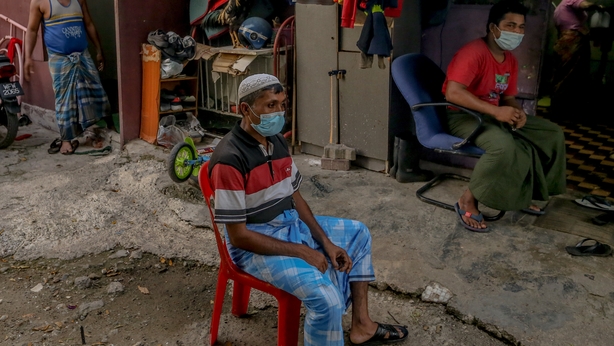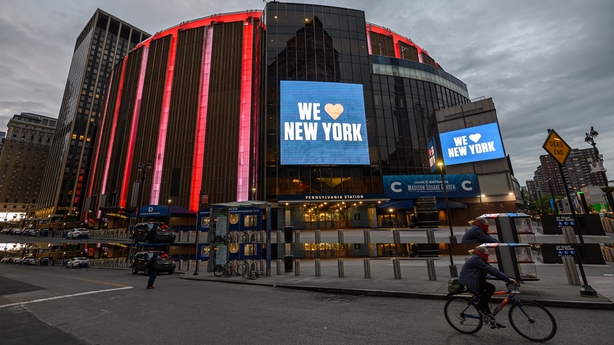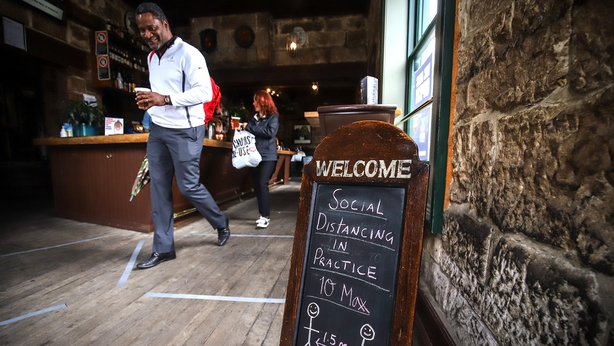Italy is set to allow free travel across the country from 3 June, according to a draft decree seen by Reuters, as the government moves to unwind the coronavirus lockdown and revive the battered economy.
Rigid restrictions were imposed on Italy in March in an effort to halt the disease and with the death rate now falling, Prime Minister Giuseppe Conte is rolling back the curbs.
The draft decree, which could still be modified before it is approved, also said all travel within separate Italian regions would be allowed from 18 May.
The death toll from coronavirus in Italy stands at 31,368 people.
Read:
Latest coronavirus stories
Despite fears of a second wave of infections, borders began opening up in Europe and lockdowns continued to ease as governments try to get stalled economies moving again, with experts warning world output could shrink by 10%.
Phase One of the Irish Government's easing of restrictions is due to get under way on Monday.
Covid-19 infections discovered in Rohingya refugee camp
The very human cost of the disease has been thrown into sharp relief with the discovery of infections in the world's biggest refugee camp, where upwards of a million Rohingya live.

"We are looking at the very real prospect that thousands of people may die from Covid-19" in these camps, Save The Children's Bangladesh health director Shamim Jahan said.
"There are no intensive care beds at this moment" in the camps at Cox's Bazaar, Jahan said.
Track and trace teams were fanning out Friday to follow up on two positive tests.
The nexus of poverty and risk was also laid bare by a World Health Organization report that warned Africa is a hotspot waiting to happen, despite so far having escaped the worst of the disease.
Researchers say health systems could quickly be overwhelmed, with modeling suggesting 231 million people could become infected.
Up to 190,000 of them could die, the study published in the journal BMJ Global Health suggested.
Despite scientists working towards a vaccine experts say it could still be many months - or even years - away.
In Latin America, the news was also looking increasingly dire.
Thousands of fresh graves are being dug in the Chilean capital's main cemetery, as the infection rate soars and as Santiago enters lockdown from Friday.
"We may need more graves, because we see what's happened in other countries," cemetery director Rashid Saud told AFP.
Trump ramps up war of words with China
In the US, President Donald Trump has ramped up his war of words with Beijing over responsibility for what he has dubbed the "Plague from China", threatening to cut ties between the two countries.
The United States has registered almost 86,000 deaths linked to Covid-19 - the highest toll of any nation, with a third of all known global infections.
In an interview aired Thursday, Trump again accused Beijing of concealing the true scale of the problem after the virus emerged in Wuhan late last year.
"I'm very disappointed in China. I will tell you that right now," he said.
Asked how the United States might choose to retaliate against what he has dubbed the "Plague from China", Trump said: "We could cut off the whole relationship".
President @realDonaldTrump: "Every other President let China do whatever they wanted." pic.twitter.com/jEffuEFUlv
— The White House (@WhiteHouse) May 14, 2020
Beijing played down the spat, saying: "To maintain the steady development of China-US relations is in the fundamental interests of the people in both countries."
The US and China are the world's two largest economies, doing hundreds of billions of dollars of mutually beneficial trade every year.
Nevertheless, the US president is keen to make Beijing the bogeyman in an election year when gloomy news has become par for the course.
New figures showed a further three million job losses, taking the newly unemployed to 36.5 million - more than 10% of the US population.

Over a third of them will have trouble paying their bills, a survey has revealed.
States are slashing their budgets because of tax shortfalls caused by the job losses, with California announcing it would have a $54 billion deficit this year.
Aussies book out Sydney bars as virus measures ease
Sydney's bars and restaurants opened their doors to customers as a weeks-long lockdown eased, with owners hoping a busy booking calendar will make up for restrictions on crowd numbers.
Although social distancing and work-from-home arrangements kept the city's streets quiet, venues said locals were eager to get back into bars and restaurants over the weekend under the relaxed rules.
Chrissy Flanagan, owner of The Sausage Factory, a bistro in Sydney told AFP bookings were rolling in.
"Every restaurant in town, whether they're opening or not, has been bombarded with requests for bookings," Ms Flanagan said.

"The desire to sit in a place that is not your house with your mates and have a drink is truly overwhelming," she said. "I am not sure what could be more Australian than that."
From today, bars and restaurants in New South Wales can accommodate up to 10 customers at a time, so long as social distancing rules are respected.
Almost 100 people have died and 7,000 cases of COVID-19 have been detected nationwide. But with new daily infections now in low double digits, the government has been keen to reopen the economy.
Virus pushes Germany into recession
Germany's treasury is also expecting a big hole in its budget, with around €100 billion wiped off the tax take in 2020.
Europe's biggest economy has already slipped into a recession, with GDP expected to shrink by 6.3% this year - the biggest contraction since 1949.
The Asian Development Bank on Friday doubled its previous estimate of the cost of the pandemic, saying the world economy would shrink by $8.8 trillion - almost a tenth of global output.
Up to 242 million jobs will vanish due to the virus, the Manila-based bank said.
Much of Europe was back on the road to recovery, with more parts of the continent opening up.
Slovenia opened its borders today after declaring an end to its coronavirus epidemic, despite new infections still being reported.
Austria and Germany were expected to open their shared border, while Latvia, Lithuania and Estonia were set to create their own "mini-Shengen on the Baltic", allowing free movement among the three countries.

